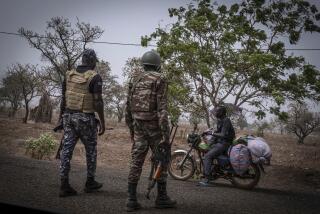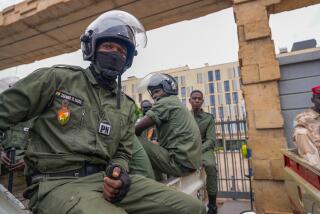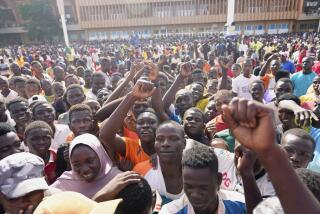Niger’s Islamic Revival Heats Up Debate
- Share via
NIAMEY, Niger — Political reforms have brought an Islamic revival to the West African state of Niger, igniting a heated debate over the relationship between state and religion.
Men cluster on street corners in the capital of Niamey in the evenings, reading the Koran together around a paraffin lamp. The bustling city market stops dead at noon for Muslim prayers.
Friday sermons by leading preachers are recorded on audiocassette and widely circulated.
Although up to 90% of Niger’s 7 million people are Muslim, Islam has had a fairly low profile until political reforms started in 1990, according to local political analysts.
A local resident noted that mosques in Niamey are only now installing loudspeakers to broadcast the call to prayer.
To illustrate the extent of Islamic revivalism, he tells the story of a Christian lawyer living near a mosque who went to the local police to complain about the noise from a newly installed loudspeaker.
“They referred him to the interior ministry, but before they could respond, mullahs ringed his house with loudspeakers and broadcast prayers all night.
“He came out in the morning after a sleepless night and withdrew the complaint.”
In the southern town of Zinder, where Islamic Sharia law was in force until the coming of French colonial rule in the 1890s, women have been physically attacked for wearing short skirts.
“It’s not the same Islam as in the Middle East,” a Niger official said. “Here it’s very closely allied with the traditional culture.”
Diplomats see the Islamic revival as part of a general explosion of enthusiasm for newly available free expression.
Former president Ali Saibou began introducing multi-party reforms in 1990 after strikes and demonstrations against his military government.
The process culminated in Mahamane Ousmane taking office in April as the country’s first freely elected president.
The drawing up of a new constitution last year prompted a dispute between Muslims wanting Niger identified as an Islamic nation and their opponents demanding an explicit declaration of a secular state. A compromise wording identifies Niger as a state not subject to any religion.
Tension between Muslims and secularists has also blocked the adoption of a code of family law.
Islamic groups can have no formal role in Niger’s political life because electoral law bans parties with a religious base, but Ali Zada of the Niger Assn. for Islamic Call and Solidarity said in an interview he believes they have a vital role to play.
“We fill a vacuum created by the rule of a non-religious state in a Muslim country,” he said.
“Divisions are emerging in the country that weren’t there before. Almost every Nigerien is a Muslim and we feel religion has a role to play in unifying the country.”
Zada’s organization is made up of young professionals, many of whom have studied in the Middle East. The country’s other four Islamic organizations draw their membership mainly from religious teachers.
“We are products of the lay system. We understand it. We may not have their social position, but we understand the world more. We are their eyes,” he said.
His movement was formed a week before the opening of Niger’s national conference in July, 1991. “It was a time when political debate was lively and we wanted to be part of that.”
The government is eager to maintain harmony, not least because the president is a devout Muslim.
Islamic groups also face opposition from Niger’s women, who firmly resist changes that they fear could limit their freedom.
Zada said his group has come into conflict with women’s organizations several times.
The Islamic resurgence is centered in the south of the country, particularly Zinder, and is strongly influenced by contacts with Muslim Hausas from Niger’s southern neighbor, Nigeria.
More to Read
Sign up for Essential California
The most important California stories and recommendations in your inbox every morning.
You may occasionally receive promotional content from the Los Angeles Times.













